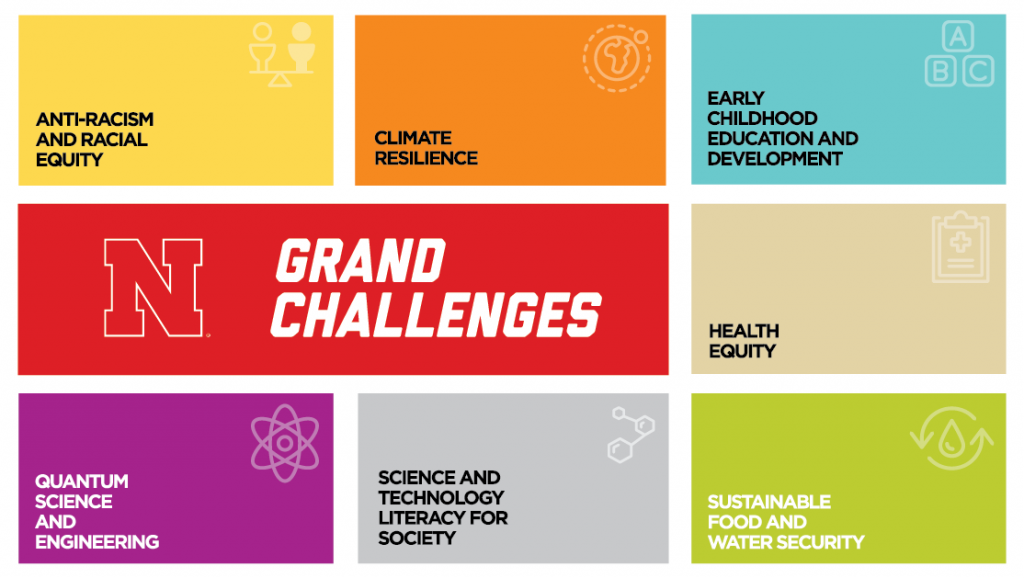Dan Moser, December 1, 2023
Panelists offer tips, advice on Grand Challenges projects
Recipients of Grand Challenges planning and catalyst grants offered advice to colleagues from their experiences during a panel discussion last month.
Panelists spoke at a Grand Challenges panel discussion Nov. 15, intended to help faculty sharpen their project planning skills and to recognize recipients of planning and catalyst grants from the second Grand Challenges Catalyst Competition.
Sherri Jones, interim vice chancellor of research and economic development, said the Grand Challenges initiative is a timely program to address challenges facing higher education. She said she recently attended a gathering of higher education leaders in which discussion was dominated by “how higher education is going to remain relevant going forward. Universities need to be very thoughtful and be intentional in moving forward.”
The Grand Challenges competition is a mechanism to do just that, Jones said.
Mohammad Hasan, assistant professor of electrical and computer engineering, said the lessons he learned from his first unsuccessful planning grant proposal helped his team successfully compete in the second round, which funded the project “Building Community Connections for Improved Climate Resilience and Food Security: A Tribal Non-Tribal Partnership Investigating the Role of Artificial Intelligence in Affecting Behavior Change.”
“I decided to approach it from a computer scientist’s perspective” the first time around, Hasan said. He said he did a better job building a team and getting others’ perspectives on the successful second attempt.
“Community relationship building is at the core of our project,” Hasan said. “We did not have that understanding. As we had initial dialogue, we started changing. I changed a lot through this process, not just as a researcher but as a person.
“This is one of the most rewarding experiences I have had from the Grand Challenges process.”
Psychology researchers Anne Schutte, associate professor, and Nicholas Hubbard, assistant professor, who are co-leading a planning grant, said getting everyone on the team involved in writing the grant proposal was key. “Now, the people on the planning grant are clear about expectations,” Schutte said.
Schutte and Hubbard also used the Toolbox Dialogue Initiative, based at Michigan State University, which is intended to facilitate collaborative research, to help with their planning grant project, “Advancing Cutting-Edge Research and Practices to Increase Access and Use of Green Space and Outdoor Play in Early Childhood Settings.”
“I would highly, highly recommend this. It was great. We have people from education, psychology, architecture, children and family,” Schutte added. “One of our big issues … (was) we used some of the same words but not in the same way. TDI helped us sort through that … helped us understand what each of us wanted to get out of project, and helped with communication.”
Hasan also noted how individual team members can interpret language differently. Tribal and non-tribal representatives, for instance, defined food waste differently.
Team establishment and clear visions are key, agreed Tomas Helikar, Susan J. Rosowski Professor of biochemistry, and principal investigator of a catalyst award, “Digital Twin Innovation Lab.”
“Make sure you build a team that’s really all-in on the vision so when you’re funded, you’re all pulling in the same direction,” he said.
The Grand Challenges program gives researchers an opportunity to think bigger than many external grant opportunities, which often have a narrower focus.
“You can think outside the box,” Helikar said. He also recommended that faculty think carefully about the proposal reviewers they recommend because “they will fill in concepts that are not in your proposal.”
Hubbard said his team is working toward a catalyst award by integrating the disparate literature and building a common knowledge foundation.
“Interacting with people I probably never would have interacted with” is valuable, Hubbard said. “I can learn from someone I have no academic overlap with. … It makes you very hopeful.”
A project team might change over time, and that’s OK, panelists said.
“Our team is a dynamic entity,” Hasan said. “Some people couldn’t change their hard-wired opinions. Some people are too rigid. In that process I learned a lot: how to ask for collaboration, how to ask for help. What are the key things I should look for in a collaboration? We looked for more people. We adapted.”
Helikar said, “I don’t think I’ve ever worked on a project where everyone is so moving in one direction. That exceeded my expectations. When I share with my colleagues from other universities, there’s envy. UNL is way ahead of the game. That’s the honest feedback I keep getting.”
Notices of intent to submit a proposal for the next round of Grand Challenges grants is Feb. 29, 2024; the application deadline is April 26.






